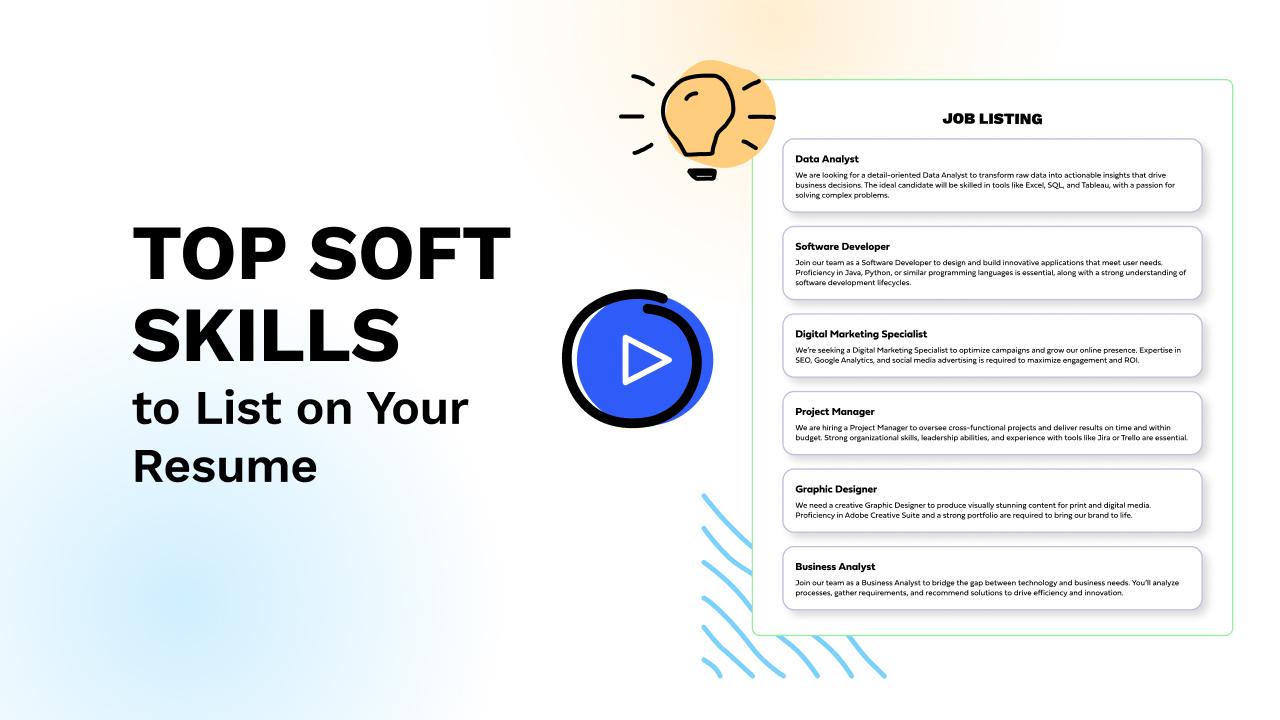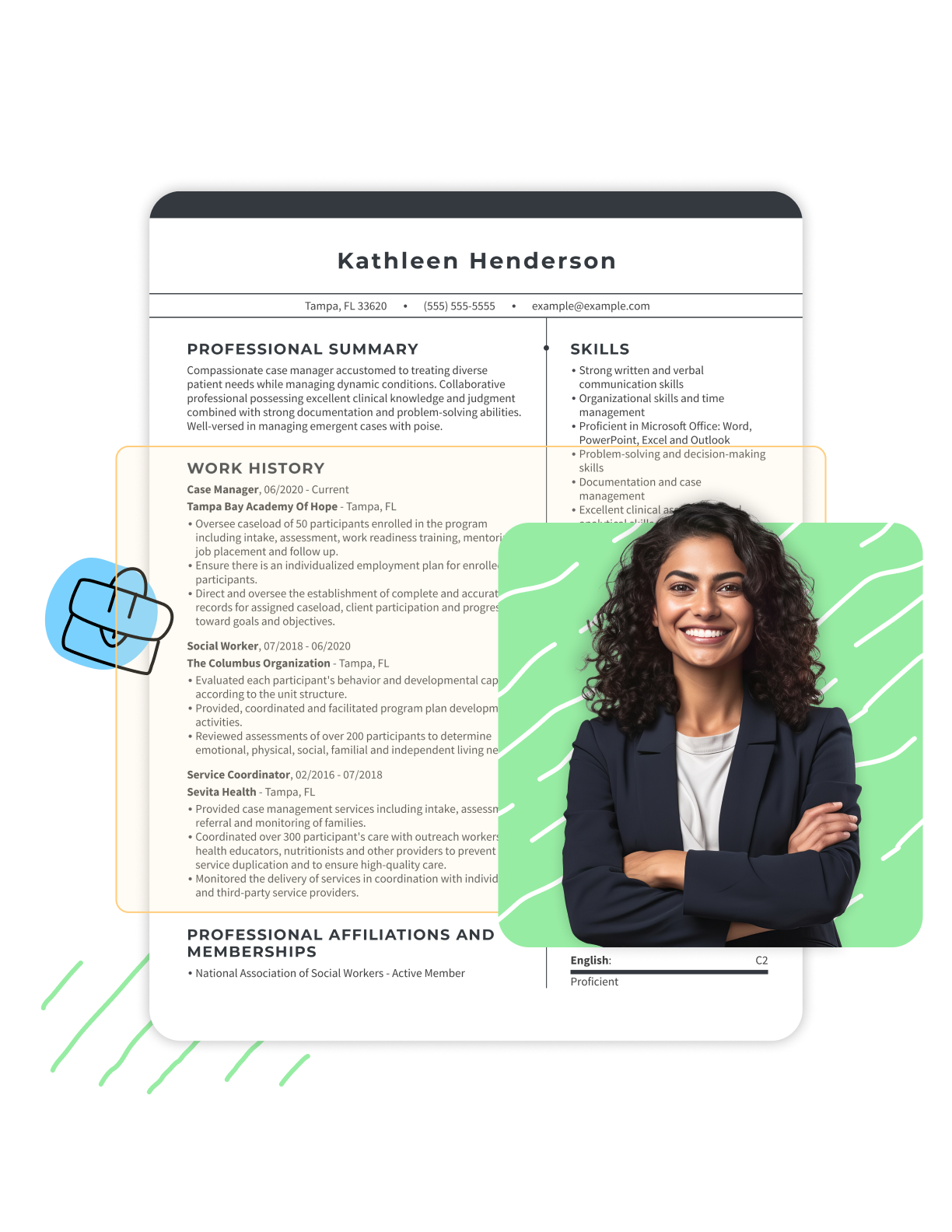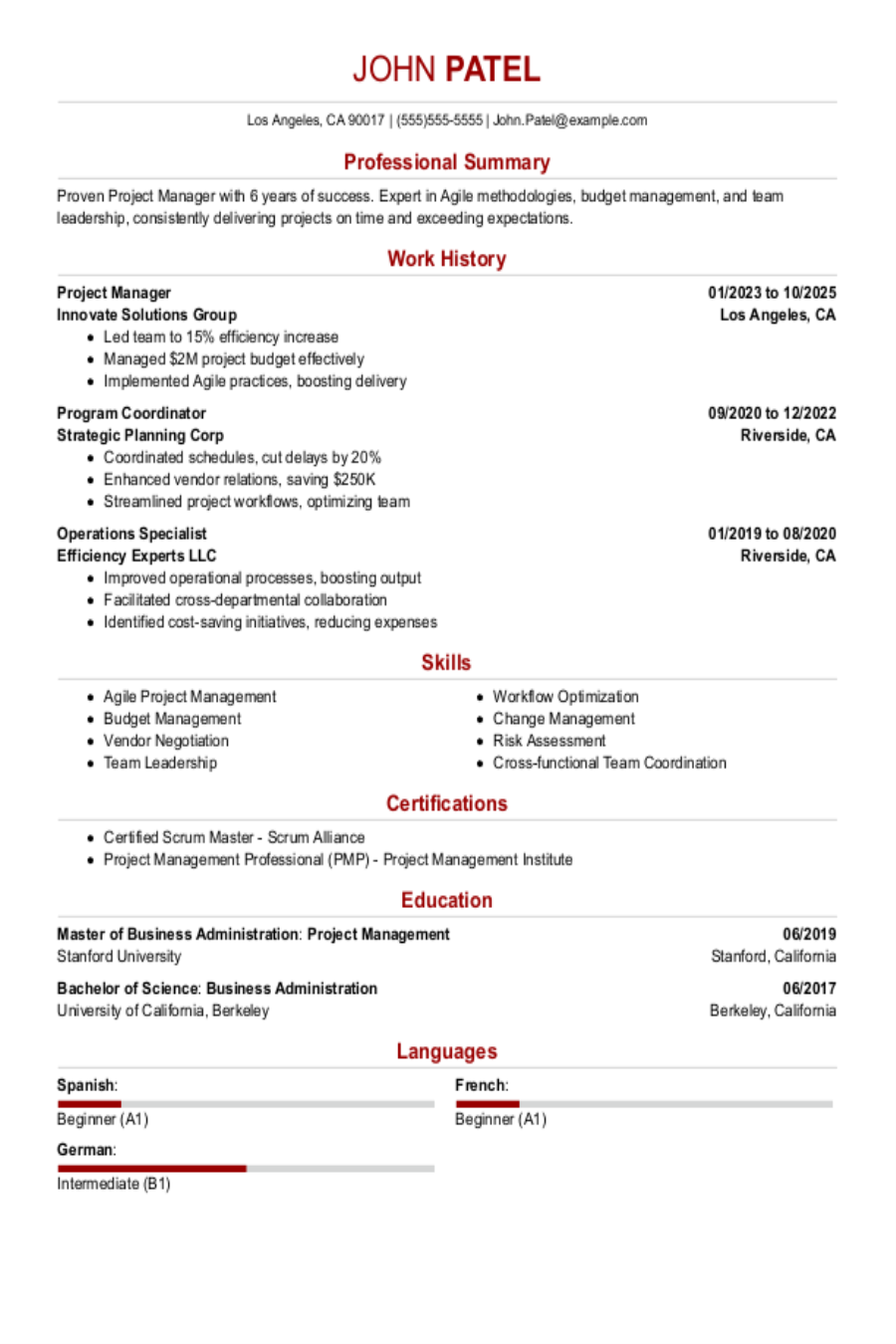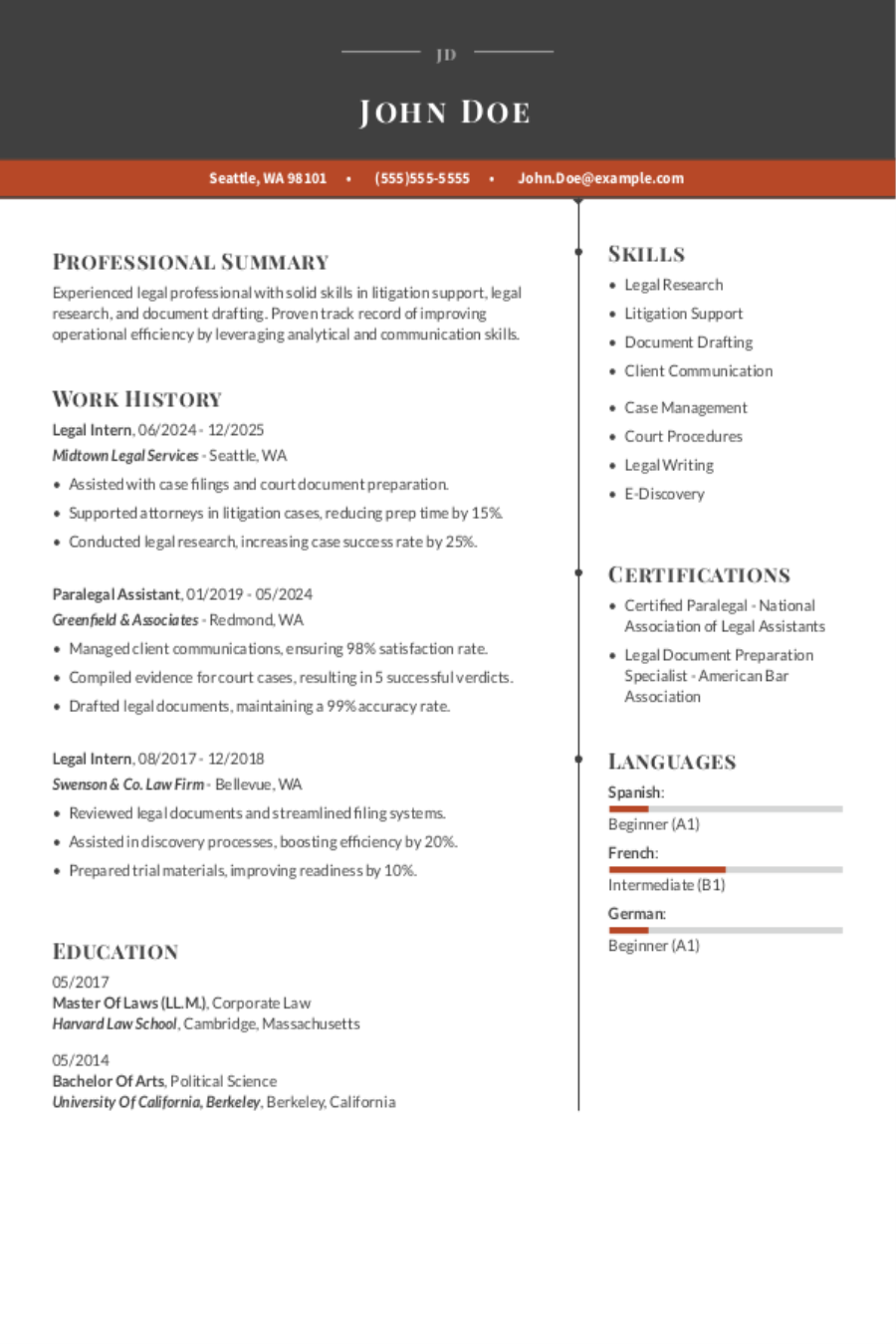In today’s job market, soft skills are just as important as technical abilities. They’re like the backbone of your work life, always there for you when navigating complex team dynamics or adapting to new challenges.
Whether you’re updating your resume or simply curious about why soft skills are so important, you’re in the right place.
Our soft skills guide will show you:
- The difference between soft skills and hard skills.
- Soft skills examples for your resume.
- Tips for listing soft skills on a resume.
- How to improve your soft skills.
- Frequently asked questions.
If you want a list of soft skills specific to your job, check out our Resume Builder. As you enter previous roles in your resume, you’ll get wording suggestions for every section.

What are soft skills?
Whether you’re a master carpenter or an award-winning graphic designer, you won’t get very far without soft skills. Soft skills are the personal qualities and attributes that enable someone to work effectively and harmoniously with others.
Employers prize soft skills because they are essential for success in any workplace, and they can’t be taught as easily as hard skills. Well-developed soft skills can help you stand out from other candidates and make a positive impression on hiring managers.
Common soft skills include communication, teamwork, problem-solving, adaptability, leadership, time management, emotional intelligence, creativity, interpersonal skills and conflict resolution.
You may be wondering how they differ from hard skills. Let’s talk about that next.
Soft skills vs hard skills: What’s the difference?
When it comes to finding success in your career, soft skills and hard skills both play a role.
- Soft skills are the personal attributes and qualities that help you positively contribute to the workplace. These skills are not necessarily tied to a specific industry or job but are qualities you possess naturally or have developed over time through experience and personal growth.
- Hard skills are specific abilities and knowledge that are usually tied to a particular industry or job. These skills are typically acquired through education, on-the-job training or professional development.
Still trying to understand the differences? This graphic will help:
- Machine operation
- Bookkeeping
- Social media
- Project management
- Video production
- Patient care
- Interviewing
- Software programming
- Work ethic
- Attention to detail
- Communication
- Organization
- Creativity
- Empathy
- Friendliness
- Adaptability
Notice how soft skills are personality traits and characteristics whereas hard skills are technical abilities?
Here are some additional soft skills examples to consider for your resume:
- Conflict resolution
- Leadership
- Storytelling
- Attentiveness
- Work ethic
- Teamwork
- Confidence
- Dependability
Ultimately, employers tend to seek applicants with a balanced mix of technical know-how, hard skills and soft skills because they want well-rounded employees who can perform well in all aspects of work.
90+ soft skill examples to list on your resume
Brainstorming soft skills to put on a resume is a great way to build out your resume sections. Soft skills fall into many different categories, including communication, leadership and creativity. We’ve gathered over 90 soft skills to consider adding to your resume.
Communication
Your communication skills help you connect effectively with others in any setting. With the list below, you can identify key areas to highlight in your resume and cover letter:
- Verbal communication
- Nonverbal communication
- Written communication
- Active listening
- Assertiveness
- Networking
- Clarity
- Cooperation
- Negotiation
- Persuasiveness
- Empathy
- Conflict management
Problem-solving
Solving problems is a key feature in pretty much every workplace, so problem-solving skills are always valued. These skills are crucial for addressing complex issues and finding innovative solutions:
- Critical thinking
- Analytical thinking
- Logical reasoning
- Initiative
- Experimentation
- Troubleshooting
Leadership
Whether you aspire to be a manager or simply a better teammate, your leadership skills will play a role in your effectiveness. Here are a few related soft skills for your review:
- Goal setting
- Strategic planning
- Ability to delegate
- Visionary-thinking
- Integrity
- Motivation
- Accountability
- Conflict resolution
Decision-making
Having strong decision-making skills will make you a much sharper professional. These skills help you choose the best course of action in various situations. Here are a few to add to your resume:
- Ethical decision-making
- Strategic decision-making
- Consumer decision-making
- Rational decision-making
- Crisis decision-making
- Tactical decision-making
Creativity
Ah, creative thinking skills… What would any job be without them when tackling unique challenges or coming up with fresh ideas? The following skills can set you apart in any competitive industry:
- Ideation
- Originality
- Open-mindedness
- Playfulness
- Imagination
- Brainstorming
- Mind mapping
- Divergent thinking
- Innovation
Adaptability
Adaptability is crucial in a rapidly-changing work environment. The following list includes key adaptability skills that can help you thrive in dynamic workplace settings:
- Flexibility
- Versatility
- Resourcefulness
- Resilience
- Responsiveness
- Curiosity
- Openness
- Optimism
Emotional intelligence
In any profession, emotional intelligence is vital for understanding and addressing others’ concerns and emotions. Here are key components of emotional intelligence:
- Self-awareness
- Self-regulation
- Intuition
- Emotional literacy
- Social awareness
- Positive attitude
- Patience
- Relationship management
- Mindfulness
- Compassion
Work ethic
A strong work ethic is essential in any field. Consider highlighting these work ethic-related skills:
- Self-discipline
- Dedication
- Diligence
- Commitment
- Focus
- Reliability
- Good character
- Responsibility
- Accountability
- Professionalism
Interpersonal skills
Interpersonal skills, also known as people skills, are crucial for anyone who interacts with others regularly. The following list includes key interpersonal skills that can enhance your effectiveness in any setting:
- Diplomacy
- Consensus-building
- Cultural awareness
- Active participation
- Mentorship
- Feedback and constructive criticism
- Tactfulness
- Respectfulness
Time management
Time management is essential for juggling multiple tasks and responsibilities. Here are some key time management skills to consider highlighting:
- Punctuality
- Prioritization
- Meeting deadlines
- Multitasking
- Concentration
- Self-control
- Self-motivation
- Time-saving strategies
- Stress management
Customer service
Customer service is valuable in many roles, even those not directly customer-facing. The following list includes key customer service skills that can help you excel in providing exceptional care to clients or colleagues:
- Client relationship management
- Service orientation
- Handling complaints
- Customer communication
- Problem-solving for clients
- Customer satisfaction
How to add soft skills to your resume: Tips with examples
Now that you understand soft skills and have plenty of examples, you may wonder how to list soft skills on a resume.
Consider these tips to make the most of your soft skills when you create your resume outline.
Sprinkle them throughout your summary
At the top of your resume, you’ll always have a resume profile or objective statement — this is a great place to highlight a few of your key soft skills.
What does that look like? Here’s an example resume objective for a warehouse associate with soft skills in bold:
Reliable and conscientious warehouse associate with three years of experience coordinating, planning and packing shipments in a high-volume, fast-paced environment. Track record of superior communication with team and vendors.
Add quantifiable metrics
Great candidates use their work experience section to showcase their skills. Instead of simply listing their job duties, they cite numbers that back up their performance.
Here’s an example from a data scientist’s resume, with the soft skill and supporting metrics in bold:
Mentored a team of five summer interns to successfully deploy a new data management process that saved the department more than $1,500 per quarter.
Call out soft skills in their own section
To create a perfect resume, you’ll need to include a skills section. How you display your skills largely depends on your resume formatting. You can mix your soft skills with the rest of your skills, create a separate skills section for them with an appropriate heading or add them to a separate section under the skills’ headings.
For example, a soft skills section for a marketing intern using a functional resume format might look like this:
Professional Skills
Creativity
- Wrote 20 blog posts.
- Coproduced the company’s first e-book.
- Developed a new social media campaign that increased customer engagement by more than 30% in three months.
Analytical Thinking
- Conducted comparative analysis of customers to identify key priorities for new campaigns.
- Measured web and social performance for insight into the business’s impact of online campaigns.
Strategy
- Created an SEO strategy that improved organic search traffic to the website by 15% year over year.
- Initiated branding strategy for new product launch.
Notice how breaking the soft skills into headers creates another opportunity to highlight quantifiable achievements.
One last thing — remember to touch on any unique skills that will give you an advantage over other candidates.
Pro tip
Wondering how your skills section is contributing to your resume’s success? Try Resume Now’s AI Resume Review for a free AI-powered look into your resume’s content and formatting.
Keep reading to find out how you can acquire new soft skills or build on the ones you already have.
How to improve your soft skills in 4 steps
Soft skills can take years to build, but you can fast-track your development with focus, energy and resources. Here are four steps you should take if you’re trying to grow your soft skills:
- Inventory your skills. You have to know your skills in order to build on them. Ask friends, family and colleagues for help identifying your strengths and weaknesses.
- Set your priorities. Which skills do you want to develop? Taking an intentional approach to soft skills development will help you chart your goals and track your progress.
- Take free online courses through Udemy and Coursera. Searching for terms like “communication” or “leadership” uncovers hundreds of options.
- Ask for feedback. Soft skills are social by nature and benefit from the support of others. Track progress by asking one or two trusted people to offer feedback on a regular basis.
Soft skills FAQ
Employers prefer employees who have a mix of soft and hard skills because they are well-rounded. Such employees can work more effectively than if they didn’t have soft skills.
For example, an auto mechanic who can fix a car engine and communicate well with customers stands a higher chance of achieving customer satisfaction than a mechanic who can fix car engines but struggles to communicate effectively.
Soft skills are important for every job and industry because they complement hard and technical skills, increasing performance and therefore the company’s chance of success.
The seven essential soft skills to develop include:
- Emotional intelligence
- Teamwork/collaboration
- Critical thinking
- Adaptability
- Work ethic
- Conflict resolution
- Openness
Developing the skills above will go a long way toward growing your career.
Soft skills and hard skills are two different skill categories — and job seekers need both.
Soft skills are the personal traits and characteristics someone develops throughout their life in and outside of work. They have a direct impact on interpersonal relationships, including those with your colleagues.
Hard skills are the technical abilities someone needs to perform their job, like knowing how to write JavaScript or operate a forklift. They are more easily measured than soft skills.
Again, developing these skill sets in tandem is the best way to further your career. Each set plays off the other, and both are needed to find meaning and success.
The functional resume format, also known as a skills-based resume, is generally considered the best format for highlighting your skills. However, chronological resumes are the most common format and remain a great option if you have a few years of work experience.
If you’re looking for more guidance, check out our library of resume examples, which have been tested in the real world. Then, find an appropriate resume template to fill in with your career achievements. Each one takes a different stylistic approach to highlighting your skills.
We also have resume layouts in Google Docs and Microsoft Word if you prefer. Don’t forget to pick a matching cover letter template when you write your cover letter.
Was this information about Top Soft Skills To List On Your Resume (90+ Examples) helpful? Let us know!
Don is a Certified Professional Resume Writer (CPRW) with more than 10 years’ experience creating digital content, including four years helping job seekers develop their careers. He holds an M.S. in Journalism from Northwestern University.
More resources

What Is an ATS Resume? How to Write a Job-Winning ATS-Friendly Resume
The rise in applicant tracking systems (ATS) means resumes nee...

How to Write a One Page Resume: Guide & Examples
Use one of our expertly crafted one-page resume examples as a ...

What Should a Resume Look Like in 2026? (+ Examples)
A good-looking resume will always use simple fonts and an easy...

Construction Project Manager Resume: Examples & Templates
As a construction project manager your resume must capture th...

Engineering Project Manager Resume: Examples & Templates
As an engineering project manager your resume must capture th...

Legal Intern Resume: Examples & Templates
As a legal intern your resume should highlight essential skil...
